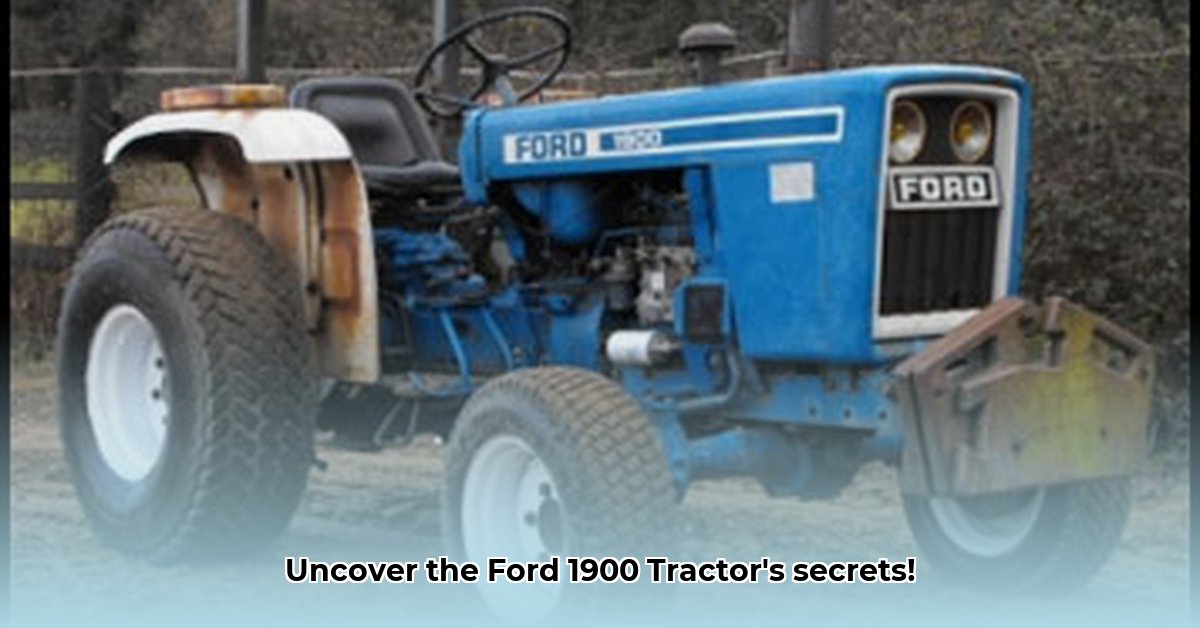
The Ford 1900 tractor, produced from 1979 to 1983, stands as a testament to the ingenuity of late 20th-century agricultural engineering. Manufactured by Shibaura (for Ford), this compact machine, despite its seemingly modest 30 gross horsepower (27 PTO), proved a reliable workhorse for countless farmers. While not a revolutionary design, its impact on farms across the country is undeniable. This comprehensive guide delves into the Ford 1900's technical specifications, historical context, and lasting legacy. See more Ford tractor photos.
Under the Hood: The Mechanics of the Ford 1900
The heart of the Ford 1900 was the Shibaura LEM853, a three-cylinder diesel engine. Known for its dependability and fuel efficiency, this engine provided ample power for smaller farms. Its compact size was a significant advantage in tighter spaces. But how did this compact engine perform in real-world conditions? Farmers often praised its reliability and ease of maintenance, traits highly valued in the demanding environment of agricultural work. The 7.7-gallon fuel tank, while not overly spacious, provided enough capacity for a typical workday; however, precise fuel consumption figures are difficult to find for this vintage tractor.
| Specification | Detail |
|---|---|
| Manufacturer | Shibaura (for Ford) |
| Production Years | 1979-1983 |
| Engine | Shibaura LEM853, 3-cylinder diesel (a robust and reliable engine for its time) |
| Horsepower (Gross) | Approximately 30 HP |
| Horsepower (PTO) | Approximately 27 HP |
| Weight | 2689-2922 lbs |
| Fuel Capacity | 7.7 gallons |
| Steering | Manual |
| Hydraulic System | Open-center |
Beyond Plowing: Attachments and Versatility
The Ford 1900's true strength lay in its adaptability. A wide array of attachments were available, transforming it from a simple plow into a multi-purpose machine. From cutting attachments for maintaining fields to snow-clearing attachments for winter, front loaders for material handling, and even backhoes for digging, the 1900 provided immense versatility to farmers. This adaptability significantly increased the tractor's value, making it a worthwhile investment for farmers requiring a machine for various tasks.
A Historical Perspective: The Ford 1900 in its Era
The Ford 1900 offers a glimpse into the agricultural technology of the late 1970s and early 1980s. Its manual steering and uncomplicated hydraulic system reflected the technological landscape of its time. Compared to today’s advanced tractors with complex electronics, the 1900's simplicity stands out. However, this simplicity translated into ease of maintenance and exceptional reliability – invaluable traits for farmers at the time. Did this simplicity limit its capabilities? While it lacked the advanced features of modern models, it provided reliable, straightforward performance tailored to the needs of many farms.
The Ford 1900 Today: Collectors, Historians, and Enthusiasts
Today, the Ford 1900 holds a special place among collectors, history buffs, and those interested in preserving agricultural heritage. Its rarity and historical significance make it a sought-after item. Collectors meticulously evaluate a tractor's condition and the availability of parts. For historians, it provides valuable insight into past agricultural methods. Museums and similar institutions find it a useful asset for educational displays. What factors drive the enduring interest in collecting and preserving Ford 1900 tractors? The combination of historical importance and the relatively straightforward nature of mechanical restoration make it an appealing option for both beginning and experienced collectors.
Actionable Advice for Different Stakeholders
Here’s practical advice for various groups interested in the Ford 1900:
Collectors: Thoroughly inspect the tractor's condition, research part availability, and understand market values before purchase. Restoration requires patience and detailed knowledge.
Agricultural Historians: Analyze the tractor's design and functionality within the broader context of agricultural technology advancement. This offers insight into farming practices, economic conditions, and the evolution of farming technologies.
Museums & Historical Societies: Assessing the tractor's historical significance and its condition is crucial before acquiring it for display and educational programs.
The Ford 1900, though a product of its time, carries a significant legacy. It represents the dependable workhorses that defined an era in farming – a testament to simplicity, durability, and reliability. Further research promises to unveil even more about this iconic tractor and its role in shaping agricultural history.
Key Takeaways:
- The Ford 1900's compact size and reliable engine made it ideal for smaller farms.
- Its adaptable design, with a wide range of attachments, significantly enhanced its versatility.
- The tractor serves as a valuable historical artifact, reflecting the agricultural technology of its era.
[1] Tractordata.com. (n.d.). Ford 1900. Retrieved from https://www.tractordata.com/farm-tractors/000/2/5/254-ford-1900.html